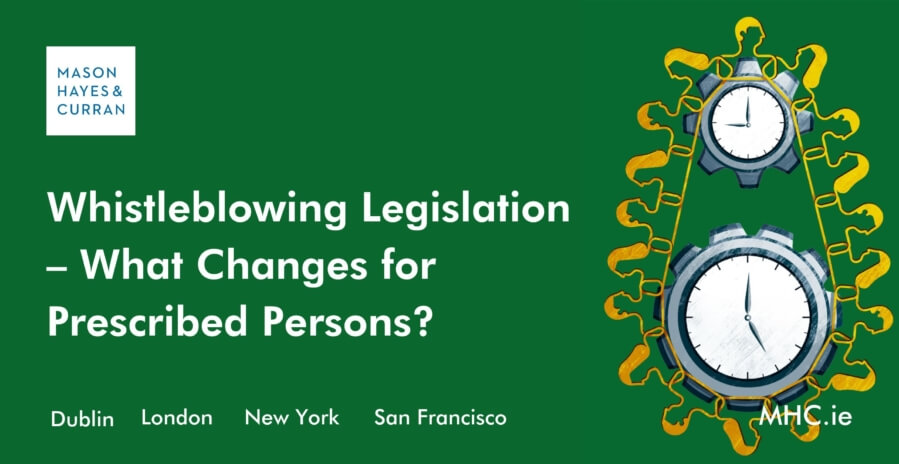
Public bodies that have ‘prescribed persons’ for receipt of external protected disclosures will be considering what changes they need to implement following the enactment in July of the Protected Disclosures (Amendment) Act 2022 (the 2022 Act). The 2022 Act amends the Protected Disclosures Act 2014 (the 2014 Act). The 2022 Act will come into force from 1 January 2023. Prescribed persons will need to be compliant with their new obligations by this date.
Prescribed persons are generally senior officials within public bodies that have regulatory functions in their sector, such as the Data Protection Commissioner and the CEO of the Health and Safety Authority.
Prescribed persons are designated, under section 7 of the 2014 Act and SI 367/2020, to receive disclosures from external workers of relevant wrongdoings that fall within their sphere of activity, as described in SI 367/2020. The 2014 Act did not impose any specific procedures for the public body to follow on receipt of such disclosures. In practice, public bodies may be using a modified version of the procedures they were required to establish under section 21 of the 2014 Act, for internal disclosures by their employees.
External reporting channels and procedures
Once commenced, the 2022 Act will place significant new obligations on the prescribed body as regards its handling of external reports. In particular, the prescribed body must establish external reporting channels and procedures, including:
- Written acknowledgement of the report within 7 days, except in certain circumstances
- Designation of staff responsible for handling reports
- Diligent follow-up by designated persons
- Feedback to the reporting person within 3 months of the date of acknowledgement and, if requested by the reporting person, at 3-month intervals thereafter
- Written communication of the final outcome of any investigation triggered by the report, subject to certain exceptions, such as where this would undermine obligations of confidentiality or legal professional privilege
- Transmission of the report to relevant EU bodies, as appropriate, where it concerns a breach of EU acts in specified areas, such as public procurement or privacy and personal data
Other obligations for prescribed persons
The 2022 Act also introduces various other statutory obligations for the prescribed body, including:
- Ensuring designated persons receive specific training on handling reports
- Enabling reports to be made both in writing and orally and, in the case of oral reports, by telephone or other voice messaging systems, or in a physical meeting, where requested by the reporting person
- Protecting the identity of the reporting person, and any person named in the report in relation to the relevant wrongdoing, except in certain circumstances
- Publishing certain information on its website, including the contact details of the prescribed person, the applicable procedures, the applicable confidentiality regime and the nature of the follow-up to be provided
Helpfully, the 2022 Act provides that, if the prescribed person decides that the report concerns matters outside the scope of their statutory functions, it should be transferred to the appropriate prescribed person. If there is no appropriate prescribed person, it should be transferred to the new Protected Disclosures Commissioner. The 2022 Act also permits the Minister for Public Expenditure and Reform to publish guidance for prescribed persons to consider in the performance of their functions under the 2022 Act. Prescribed bodies should note that it is a criminal offence under the 2022 Act to breach the duty of confidentiality as regards the reporting person’s identity.
Next steps
Given the extent of the forthcoming changes, public bodies with prescribed persons should be:
- Developing and finalising their policy and procedure for external protected disclosures
- Designating staff to handle reports and providing specific training
- Updating their websites, and
- Ensuring their systems are prepared to receive reports both orally and in writing, while maintaining the integrity and confidentiality of the information and protecting the identity of the reporting person and any persons concerned
For more information on the changes for prescribed persons, contact a member of our Employment & Benefits or Public, Regulatory & Investigations teams.
The content of this article is provided for information purposes only and does not constitute legal or other advice.






